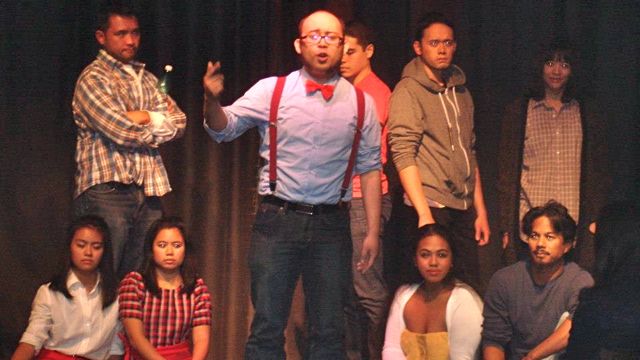SUMMARY
This is AI generated summarization, which may have errors. For context, always refer to the full article.

NEW YORK, United States – Twelve Filipino-American theater artists shook the small stage of Nuyorican Poets Cafe at the Lower East Side of the Big Apple, with their autobiographic monologues mostly centered on what it means to be half-Pinoy, half-American living in these times in the US.
Inventively titled Tagalogue — an obvious mix of ‘Tagalog’ and ‘monologue’ — this series of soliloquies written and performed by Fil-Am stage actors evoked emotions that ranged from growing-up pains, freedom, to the joy of knowing one’s cultural roots — all arising from the experience of being a Filipino-American in the diaspora.
Tagalogue was initiated by Leslie Espinosa, a hairstylist and make-up artist born and raised in San Diego, California, whose first visit to the Philippines in 2011 “changed her life” that she was inspired to come up — together with her other Fil-Am artist friends in New York, namely Kilusan Bautista and Precious Sipin — to produce a theatrical piece that would keep the flame of their motherland’s culture alive.
The show premiered in July 2012 and was shown as “Tagalogue, volume 2” this October, with a new set of cast, and part of the official celebrations of the Filipino-American Historical Month in New York.
While Filipinos now rank as the second largest Asian ethnicity in America, they are still often considered an “invisible minority.”
Andre Dimapilis: “My Name is…”
Brooklyn-based Andre opened up the show with an interactive monologue/dialogue where he asked the audience what they thought his ethnic background was.
Audience members shouted out various cultures, from Eskimo, to Hondurian, to Mexican — never Filipino.
Precious Sipin: “Dalaga”
For her part, Precious’ segment was a comic show-stopper with her ebullient mimicry of her Pinay mother’s Tagalog accent, expressing a gamut of feelings about her daughter’s entry into young womanhood: from the excitement over having her first menstruation, to her trepidation on her daughter’s first date with a white guy.
Leslie Espinosa: “Letters Series”
Leslie’s piece was interspersed in-between the first act, where we find her reading from actual letters of love and encouragement from her dad who was a US Navy.
Randy Gener: “The Cry and The Freedom”
Award-winning playwright Randy performed his politically-inspired work-in-progress where he sports a Tagalog accent.
Philippe Garcesto: “Halo-Halo Series”
Like Espinosa, Jersey-based Philippe’s piece was likewise interspersed in-between other acts, as he speaks of his Ilonggo origins that he now barely knows about, his problematic father, a supportive mother and his journey of “fitting-in” to a seemingly material-centered culture of America.
Julian Pormentilla: “Legos”
Julian’s piece is another confessional where he passes around the audience actual pictures of him and his “kuya” (older brother) playing Lego toys of their childhood.
More than nostalgic reminiscences of their innocent days of playing in the world of Legoland, Julian speaks of how his brother’s act of sharing the Lego bricks to make his spaceship “fly” was the first act that taught him the value of cooperation — a value that he himself saw innately built in the genetic make-up of his Pinoy family, even as they are now in the US.
Robert Wolf: “White Sheep”
Despite his subdued personality, Robert surprised the audience with his humorous self-revelation about his identity crisis, being the only “white guy” and thus “white sheep” in his family.
Born to a Jewish-American father and a Filipina mother, Robert narrates being joked about for his “whiteness” by town folks during his visits to the Philippines.
Yet in the end, Robert relents to admitting how he sees himself “more Filipino” than Jewish or American.
Jessica and Joelle Abejar: “I Am, version 2.1”
The sister tandem of Jessica Abejar and Joelle Abejar also stole the show with their hard-hitting conversational piece; they are shown seriously throwing quick-witted lines to each other about what is expected of them as children born to Filipino parents.
“Do you talk to God, do you watch teleseryes, do you eat rice, do you sing the karaoke?” were a few of the questions they posed to each other that laid bare an interrogative set of cultural stereotypes surrounding what it has meant, quite superficially, to be a Filipino.
Directed by Grant Thomas (perhaps the only non-Filipino in the production) Tagalogue is run by a cast on a volunteer basis who are simply fueled by their love and affinity to their homeland and its culture.
After calling for submissions of stories and holding auditions — with the main criteria being an “original work on Fil-Am identity that one wrote or one that you wanted to perform based on someone else’s piece” — Thomas and Espinosa chose the writers and performers for the last two runs.
Having shelled out mostly from her savings just to get her “Tagalogue dream” moving, founder Espinosa shares how she has now learned to create a page in their website where people can pitch in their donations.
Sharing how theater and the arts have helped her and her peers to educate others about their journey back to their cultural roots, Espinosa finally shares her vision for Tagalogue:
“When people in the audience were asking when the next one was, and saying that they wanted to be a part of the next one, there is nowhere to go but forward.
“I want to be able to take the blueprint for this show to youth groups, college groups, more communities all over the country and the world.” – Rappler.com
Add a comment
How does this make you feel?





There are no comments yet. Add your comment to start the conversation.